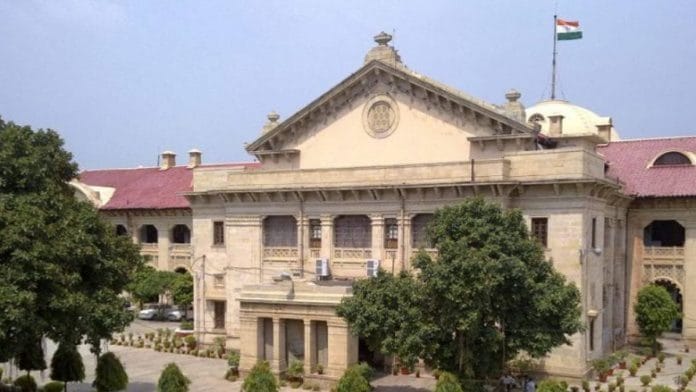New Delhi: If a group of missionaries visits a colony dominated by members of the Scheduled Caste community, assures them job and free nurses’ training programme, and then gets their consent to convert to Christianity, then such conversion is not out of free will, but is forced upon, the Uttar Pradesh government has told the Allahabad High Court.
Similarly, the provisions under the Muslim personal law that require a non-Muslim to convert for the purposes of a valid marriage would also amount to forceful conversion, the state has said in an affidavit that was filed before the HC last week.
The document, submitted in response to petitions demanding repeal of The Uttar Pradesh Prohibition of Unlawful Conversion of Religion Act, 2021, defended the promulgation of the new legislation on the ground that the Constitution of India abhors “any form of forceful conversion,” particularly in matters of religion.
“Being a secular state, it becomes the foremost duty of the state to protect its citizens from any kind of unlawful or forceful conversion so that the liberty of thought, faith, belief and worship as well as equality or status stands safeguarded thereby assuring the dignity of the individuals,” the affidavit states.
It then goes on to demonstrate everything that can be interpreted as forceful conversion. According to the explanation given in the affidavit, conversion done for any wrongful gain would not be considered as valid conversion.
The affidavit also includes two examples of what cannot be considered forceful conversion.
In the first situation, the state said a child who is not a Christian, attending a convent school, reciting a morning prayer there, and reading scriptures from the Holy Bible would not mean he is a convert, or has started believing in Christian faith.
“Students of a non-Christian religion believe in their own faith and there is no loss of equality of status or loss of dignity and at the same time they have a choice to study in a particular institution,” read the affidavit.
As a second example, the affidavit talks about a Christian family residing as a tenant along with a non-Christian family. Here, under the terms and agreements of the tenancy the former is bound to follow certain restrictions, including not drinking, even during festive occasions, or eating non-vegetarian food. At the same time, the family is made to follow certain rituals performed by the landlord who is not a Christian. However, the state argued that since the tenant is not forced to stop visiting the church, this will not amount to forceful conversion.
Also read: 5 lakh ‘forced’ into Islam, funds from Gulf, UK: What UP ATS found in ‘conversion racket’ probe
‘No freedom of choice, loss of dignity’
Explaining why a situation where missionaries converting those from the scheduled caste with promises of free vocational training or jobs equalled to forceful conversion, the affidavit states, “Here there is no freedom of choice, but choice has been obtained by certain allurements and the community where (after conversion) they are being received still looks upon them as converts. There is no equality of status, let alone freedom of conscience.”
The affidavit also includes a second example of a supposed forceful conversion, in the form of an inter-religion marriage between a Muslim and non-Muslim. According to the UP government, an adult Hindu woman decided to marry a Muslim man, but the Muslim personal law does not give her a full status of a wife and she can be deprived of inheritance till she converts.
“It is only when the Hindu woman gives up her faith and stops worshipping idols and accepts Islam as her religion, and post consummation of her marriage, she will be considered to have entered into a valid marriage,” the affidavit noted.
In the state’s view even though the Hindu woman does not wish to give up her faith, she has to do so to enter into a valid marriage. This, according to the state’s contention, will amount to forceful conversion.
“Here, again there is exercise of freedom of choice, but there is loss of dignity and the conversion is not exercised as a choice, but on account of compulsion due to personal law intervening,” the affidavit submitted.
Admitting that an individual’s agency to love “unequivocally falls within the sphere of privacy”, the state argued it does not mean that as a welfare state it should abdicate its responsibility to ensure that such an agency is not threatened by extraneous factors such as coercion and fraud.
However, Shaswat Anand, advocate for one of the petitioners in the case, called the state’s counter-arguments “astounding”.
“State is ignoring the fact that adopting the faith of a partner is an integral aspect of marriage for familial integration and social acceptance, apart from securing the rights of a wife and her children,” Anand told ThePrint.
The affidavit, he added, suffers from the “vice of vagueness and overbreadth”, and creates a situation of “communal apartheid” in the society.
(Edited by Poulomi Banerjee)
Also read: Couple moves court for protection, becomes first to be booked under Uttarakhand’s religion law






